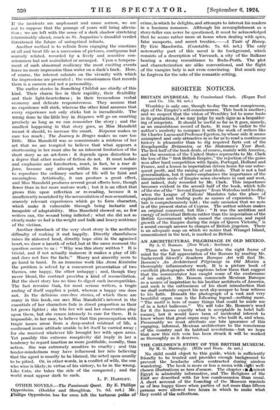SHORTER NOTICES.
Wembley is only one, though to-day the most conspicuous, sign of the Empire's self-consciousness. This book is another ; and we suspect that the vision of Wembley led to some haste in its production, if we may judge by such signs as a bespatter- ing of misprints. It should be useful so far as it goes, namely, as an unambitious record of facts. It may be unfair to the author's modesty to compare it with the work of writers like Sir Charles Lucas and Professor Egerton, by whose side it seems uninspired and only attractive in so far as to read a continuous history is pleasanter than to dig required facts out of the Encyclopeedia Britannica, or the Statesman's Year Book. The first half of the book deals, of course, mainly with America, and the secession of the United States represents to Mr. Clark the loss of the " first British Empire," the rejection of the gains won after hard competition with Spain, Portugal, Holland and France, and a lesson in imperialism driven home for our subse- quent profit, and the raising of our ideals. That is not a bad generalization, but it under-emphasizes the importance of the innumerable seeds of Empire sown elsewhere in east and west, and indeed; duly recorded by Mr. Clark. This importance becomes evident in the second half of the book, which tells of the rise of the " Second Empire " from Waterloo until to-day, when the League of Nations' Mandates take the place of exploration and trading posts as causes of expansion. The tale is comprehensively told ; the only omission that we note is of the present status of Cyprus. The author seldom makes an original comment, but this : " It was the ambition and energy of individual Britons rather than the imperialism of the British Government which caused the enormous and rapid growth of the Empire during the reign of Queen Victoria," is a sound enough answer to charges of British jingoism. There is an adequate map on which we notice that Wrangel Island, unmentioned in the text, is marked as British.






































 Previous page
Previous page